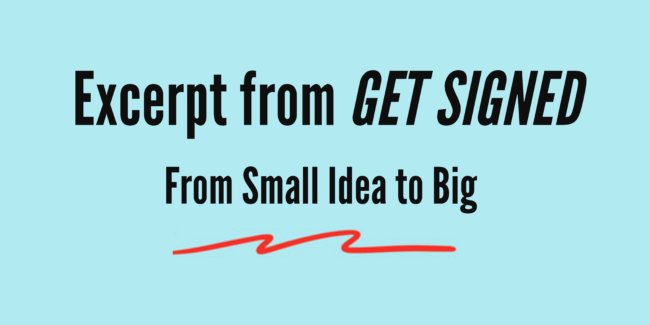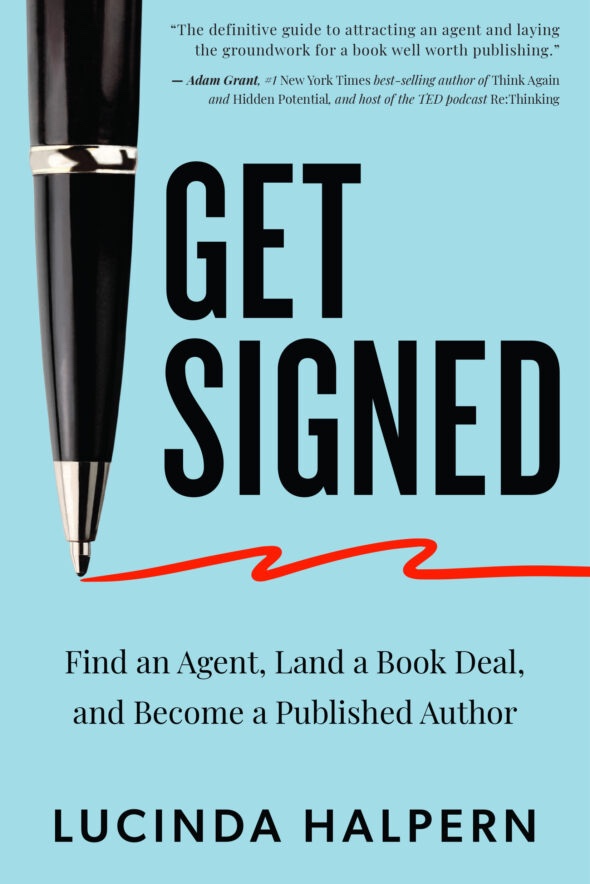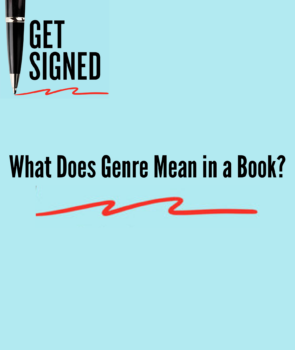Search
Take Your Idea From Small to Big: Literary Agent’s Key for How to Come Up With a Book Idea
Excerpt from Get Signed by Lucinda Halpern. All Rights Reserved

We’ve all sat at our desks with our pen and paper ready but wondering what to write about. Let me guide you landing on timely, timeless big idea.
Landing on the first key, the right concept, can take experimentation and time. But I have some parameters to follow to tell you if you’ve truly discovered your big idea that grabs an agent at first read. Mining for it is an art, but it is also a science. You are laying the strong foundation that will shape everything that follows.
The two necessary conditions for a big idea are:
- It has a universal theme and a unique point of view.
- It is timely and timeless.
Your whole career trajectory can change when you understand this. It is the simplest way to get at the essence of your message, and for nonfiction authors, you’ll find that it will inform, and then transform, your brand and your business.
You may have entered the world of books because you’ve always loved reading and writing or dreamed about becoming an author since childhood. But go deeper. Why did you decide to write a book? Your idea begins with you, but it must be bigger than you.
Did you encounter a challenge and look for a resource to guide you but couldn’t find one? Or is there a topic you always wanted to immerse yourself in to learn more about? Or maybe, as a novelist, you couldn’t stop fantasizing about a particular plot or set of characters? Your “why” for writing your book is knowing the end effect you want to have on a reader.
Your big idea is not the outline of your book but rather the core message that it brings to light. Ready for some tough love? The book idea you’re considering or actively pitching agents is probably too small. It’s one of the most common mistakes. And agents and editors will pass on an idea that’s seen as “familiar” or “niche” (aka small). Here are some real examples from the slush pile that we see regularly:
- Memoirs about healing based on a person’s life story, devoid of other characters or themes
- The overly done and derivative self-help book empowering us to be “authentic” without a novel observation or uncommon method
- Biographies or histories of a person or time period not well known, without a compelling reason why this particular story has appeal today
- Novels (whether in romance, fantasy, mystery, or other genres) without a surprising twist or stand-out character
- Business books that lean too heavily on memoir and promote the same “how-to” principles without any fresh insights
Your book will need to contribute something new to the category or conversation, and that quality of differentiation is what truly makes a book stand out.
The Timely/Timeless Equation
Now that you’ve identified your universal theme and unique point of view, let’s explore how your book meets the second parameter for a big idea of being both timely and timeless.
A book is timely when it fits within a larger cultural conversation, specifically one that has been given attention by the media. It answers the question all agents and editors ask every time they receive a pitch: Why is this book important now? Have there been regular news stories or social media chatter relevant to your subject? Is there a prominent television series relevant to your work that has everyone talking?
In the industry, we refer to timely books that are destined to capture media interest as having frontlist appeal. This basically means that because your book concept is zeitgeisty and fresh, it should sell well in the short term, gaining momentum right out of the gate.
Publishers wish to see timeliness because it poises you for national news attention, where a wide audience will learn about your book through television, radio, print, online features, podcasts, or social media. For Paul Whitlatch, executive editor at Crown, an imprint of Penguin Random House, “It’s always the dream that a book is not just responding to events, but that the book is so good, it can actually drive the story and create revelations.”
But that’s not all. You still need to think critically about how your book could be considered timeless. A timeless book is a long-term earner. While the industry is appetized by media attention, we’re not looking for a flash-in-the-pan success. If your idea does not have the enduring value to carry it beyond the transience of media or a reader’s short attention span, it usually won’t be a book publishers will value seriously. Even more critical than frontlist appeal is what’s called backlist appeal. The book that “backlists” can sell several years following its publication or even many years after that.
At the end of the day, it’s about walking the line of universal and unique, hot off the press and evergreen.
Want more advice for your publishing journey? Preorder Get Signed: Find An Agent, Land A Book Deal, and Become A Published Author today to receive exclusive bonuses.
If you’re just starting out, explore our beginner resources on Get Signed








